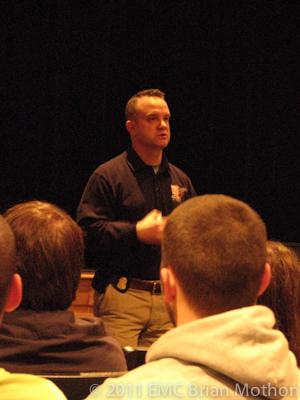By: Anni Balbian
FBI Special Agent David C. Fallon came to Galway on April 5 to educate students about internet safety, sexting and Internet sex predators. Fallon works undercover online as a teenage boy or girl to try to find and prosecute internet sex predators. Fallon talked about the risks of talking to strangers online. Fallon commented, “The internet is one of the greatest inventions.” People just don’t realize how dangerous it can be.
Fallon suggested that students Google their own name, to see all the information that might be out there for anyone to see. You have to think about what you choose to post. Mr. Kirvin said “It’s your choice of how you’re acting and the choices you’re making.” The people that could be looking at you online are parents, teachers, coaches, future employers, law enforcement, college admissions officers, and also online predators. Whatever is out there on the internet can affect your future job, effect what college you get into, and the online predators are looking at everyone, “They are not going to quit,” said Mr. Fallon. He shared stories and pictures of predators who were caught and prosecuted.
Sexting is a relatively new concern. The first thing Fallon warned us about sexting is, “The picture you send out there is not coming back, it’s out there. Any picture you upload to the web can be viewed by anyone.” The law states that any sexually explicit picture of someone under 18 years old constitutes child pornography. Anyone that breaks this law has to register as a sex offender. This charge will stick with a person forever. Even if a person just forwards the explicit image, they can be charged with a crime. Fallon kept repeating the fact, “I can guarantee it will not stay private. Once an image is sent, it is NEVER coming back. Never.”
Fallon explained how students can protect themselves when they are online. He assured students that a predator can be a person you least suspect. You may be talking online to a stranger, thinking they are one thing, but they are really someone quite different. An 11th grader told me that, “I met a guy on a online chat site, and talked to him for over two years. Things started to get weird and I ended it before anything major happened. Don’t fall into a fake love with a stranger.”
Kenzie Bahr commented, “Middle schoolers should be informed about all of this. Kids are getting younger on Facebook and they don’t consider the dangers of sexting. I don’t think they realize the danger.” Fallon shared that victims are often from dysfunctional families, who have unsupervised access to the computer. Samantha Pappalau told me “People shouldn’t be friends with people they don’t know on Facebook.”
When asked if he had a final comment for Galway students, Fallon remarked, “Learn from our presentation: it’s a dangerous place online, be aware of the behaviors which put you at risk while online.”

